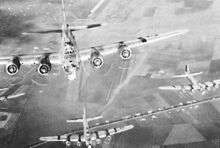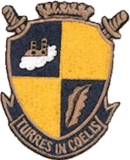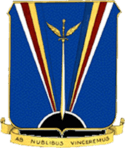Boeing B-17 Flying Fortress Units of the Mediterranean Theater of Operations

The Mediterranean Theater of Operations (MTO) was the second-largest user of the B-17 Flying Fortress during World War II. There were a total of six combat groups (twenty-four squadrons) equipped with the bomber assigned to the Theater.
Overview
Initially equipped with the B-17F Fortress, two bombardment groups (97th and 301st) were flown from airfields in England to Algiers and Oran in Algeria in November 1942 after the Operation Torch landings. They were assigned to the 5th Bombardment Wing, XII Bomber Command, Twelfth Air Force.[1]
The initial two combat groups were joined in February 1943 by the 99th and in April 1943 by the 2d Bombardment Groups, which arrived from the United States. These heavy bomber units supported the American Fifth Army as it drove west into Tunisia during the North African Campaign. Initial targets were enemy positions in Tunisia, Sicily, Italy and islands in the Mediterranean Sea.[1]
On 1 November 1943, Twelfth Air Force became a tactical organization of fighters and medium bombers. Its heavy bombardment units (B-17 and B-24 Liberator) were joined with those of Ninth Air Force which had been based in Libya and which was moving without personnel or equipment to England. The combined heavy bomber forces were designated as Fifteenth Air Force, with all B-17 groups remaining assigned to the 5th Bombardment Wing. Fifteenth Air Force's mission was to carry out long distance bombardment missions against enemy targets in Southern and Central Europe. The groups were also upgraded to the B-17G Fortress in late 1943, and were moved to newly captured airfields in the Foggia area of Southern Italy. In Italy two new B-17 groups, the 463d and 483d Bombardment Groups arrived from Third Air Force training airfields in the Southeastern United States in the spring of 1944 to reinforce the command.[1]
From their bases in Southern Italy, the Fortresses engaged in long-range strategic bombardment attacks against the enemy in the Balkans, Occupied Italy, Austria, Germany and France. Additionally, Fifteenth Air Force B-17s joined with Eighth Air Force B-17s as part of Operation Frantic, the shuttle bombing raids against targets on the Eastern Front, landing at Poltava Airfield (AAF-559) in the Soviet Union during the spring of 1944.[1]
Fifteenth Air Force, along with its B-17 units were inactivated after the German Capitulation in May 1945.[1]
Airfields
B-17 units in the Mediterranean Theater of Operations operated from the following Airfields:
- Algeria (Twelfth Air Force) [1]
|
|
- Tunisia (Twelfth/Fifteenth Air Force)[1]
|
|
- Italy (Fifteenth Air Force)[1]
|
|
- Foggia Airfield (2d Bombardment Group, Postwar use, unit inactivation and aircraft storage area)
- Marcianise Airfield (97th, 99th Bombardment Groups) (Postwar use, unit inactivation and aircraft storage site)
- Pisa Airport (483d Bombardment Group) (Postwar use by Air Transport Command)
Most combat airfields were temporary wartime facilities quickly constructed with pierced-steel planking runways and parking areas, with tents used for personnel quarters and a few wooden buildings used for operations. In Tunisia and Italy, some captured German Luftwaffe or Italian Air Force (Regia Aeronautica) airfields were repaired and placed into service. Today, most show little evidence of their existence other than some faint outlines in agricultural fields.
Units
- US Army, Middle East Air Force (USAMEAF) [2]
- 2 July – 18 December 1942 [2]
- 1st Provisional Bombardment Group; Later: 376th Bombardment Group (No Tail Code) [2]
- Provisional organization formed at RAF Lydda, British Palestine on 1 July 1942. It had nine B-17E Flying Fortresses transferred from the 7th Bombardment Group, Fifth Air Force in Australia that had escaped from the Philippines or were sent from the United States in January 1942. The B-17s attacked the harbor at Tobruk, Libya seven times with day and night raids throughout July. Withdrawn for depot-level maintenance then returned for several more raids against enemy targets in Libya, Crete and Greece during October–December 1942. Last operational use made on 18 December 1942 when they attacked harbor facilities at Sousse, Tunisia. Transferred to non-combat duties with Air Transport Command.[2][3]

- 25 April 1943 – 1 July 1945[4]
- Entered Combat: 28 April 1943[5]
- 20th Bombardment Squadron (Circle-Y)][6][7]
- 49th Bombardment Squadron (Circle-Y V)[7][8]
- 96th Bombardment Squadron (Circle-Y T) [7][9]
- 429th Bombardment Squadron (Circle-Y Half-Arrow) [7][10]
- Deployed from Great Falls Army Air Base, Montana to Camp Don B. Passage (Casablanca), French Morocco, 12 April 1943; Air echelon arrived at Marrakesh, French Morocco, 16 April 1943; Operations began from Navarin Airfield, Algeria, 22 April 1943 Inactivated at Foggia Airfield, Italy, 28 February 1946[4]

- 13 November 1942 – 29 October 1945 [12]
- Entered Combat: 16 November 1942
- 340th Bombardment Squadron (Triangle-Y O Red Diagonal Stripe Tail Rudder) [7][12]
- 341st Bombardment Squadron (Triangle-Y 1 Red Diagonal Stripe Tail Rudder) [7][13]
- 342d Bombardment Squadron (Triangle-Y 2 Red Diagonal Stripe Tail Rudder) [7][14]
- 414th Bombardment Squadron (Triangle-Y 3 Red Diagonal Stripe Tail Rudder) [7][15]
- Transferred from VIII Bomber Command, 13 November 1942; Arrived Maison Blanche Airport, Algiers, Algeria, 13 November 1942; The first combat heavy bomber mission of Twelfth Air Force was flown from Maison Blanche Airport on 16 November 1942 when six B-17s of the 340th Bombardment Squadron attacked Sidi Ahmed Airfield at Bizerte, Tunisia. Inactivated at Marcianise Airfield, Italy on 29 October 1945 [11]

- 22 February 1943 – 8 November 1945 [17]
- Entered Combat: 16 March 1943[5]
- 346th Bombardment Squadron (Diamond-Y I) [7][17]
- 347th Bombardment Squadron (Diamond-Y II) [7][18]
- 348th Bombardment Squadron (Diamond-Y III) [7][19]
- 416th Bombardment Squadron (Diamond-Y IV) [7][20]
- Deployed from Sioux City Army Air Base, Iowa, 22 February 1943; Operations began from Navarin Airfield, Algeria 22 February 1943. Inactivated at Marcianise Airfield, Italy, 8 November 1945 [16]

- 26 November 1942 – 28 July 1945 [22]
- Entered Combat: 28 November 1942[23]
- 32d Bombardment Squadron (Square-Y Green Tail Rudder A/1) [7][24]
- 352d Bombardment Squadron (Square-Y Green Tail Rudder B/2) [7][25]
- 353d Bombardment Squadron (Square-Y Green Tail Rudder C/3) [7][25]
- 419th Bombardment Squadron (Square-Y Green Tail Rudder D/4) [7][22]
- Transferred from VIII Bomber Command, 26 November 1942; Arrived at Tafaraoui Airport, Oran, Algeria on 24 November 1942, mounted first combat mission on 28 November, attacking Bizerte Airfield and dock area in Tunisia. Moved to Biskra Airfield, Algeria, 16 December 1942. Returned to Sioux Falls Army Air Field, South Dakota, 28 July 1945 [21]

- 9 March 1944 – 25 September 1945
- Entered Combat: 30 March 1944[27]
- 772d Bombardment Squadron (Wedge-Y Orange Tail Rudder) [7][28]
- 773d Bombardment Squadron (Wedge-Y Orange Tail Rudder) [7][29]
- 774th Bombardment Squadron (Wedge-Y Orange Tail Rudder) [7][30]
- 775th Bombardment Squadron (Wedge-Y Orange Tail Rudder) [7][31]
- Deployed from Lakeland Army Airfield, Florida, 9 March 1944; Operated from Celone Airfield, Italy 9 March 1944 – 25 September 1945 Inactivated in Italy [26]

- 9 March 1944 – 25 September 1945 [33]
- Entered Combat: 1 April 1944[34]
- 815th Bombardment Squadron (Y-Star Red Tail Rudder I) [7][33]
- 816th Bombardment Squadron (Y-Star Red Tail Rudder II) [7][35]
- 817th Bombardment Squadron (Y-Star Red Tail Rudder III) [7][36]
- 840th Bombardment Squadron (Y-Star Red Tail Rudder IV) [7][37]
- Deployed from MacDill Army Airfield, Florida, 30 March 1944; Operated from Sterparone Airfield, Italy, 9 April 1944 – 15 May 1945
- After war ended, assigned to Air Transport Command and moved to Pisa Airport, Italy, 15 May 1943. B-17s converted to transport configuration and used to transport personnel to Port Lyautey Airfield, French Morocco where ATC transports moved them across the Atlantic. Inactivated in Italy on 25 September 1945 [32]
References
![]() This article incorporates public domain material from the Air Force Historical Research Agency website http://www.afhra.af.mil/.
This article incorporates public domain material from the Air Force Historical Research Agency website http://www.afhra.af.mil/.
- 1 2 3 4 5 6 7 8 9 Maurer, Maurer (1983). Air Force Combat Units Of World War II. Maxwell AFB, Alabama: Office of Air Force History. ISBN 0-89201-092-4., pp25-26
- 1 2 3 4 COMBAT CHRONOLOGY US ARMY AIR FORCES MEDITERRANEAN - 1942
- ↑ 9th Bombardment Squadron 7BW History office
- 1 2 Maurer, Units, 2d Bombardment Group pp25-26
- 1 2 COMBAT CHRONOLOGY US ARMY AIR FORCES MEDITERRANEAN - 1943, PART 1
- ↑ Maurer, Maurer, ed. (1982) [1969]. Combat Squadrons of the Air Force, World War II (reprint ed.). Washington, DC: Office of Air Force History. ISBN 0-405-12194-6. LCCN 70605402. OCLC 72556.
- 1 2 3 4 5 6 7 8 9 10 11 12 13 14 15 16 17 18 19 20 21 22 23 24 Hess and Styling (2003), B-17 Flying Fortress Units of the MTO (Combat Aircraft) Osprey Publishing, ISBN 1841765805
- ↑ Maurer, Squadrons, 49th Bombardment Squadron
- ↑ Maurer, Squadrons, 96th Bombardment Squadron
- ↑ Maurer, Squadrons, 429th Bombardment Squadron
- 1 2 Maurer, Units, 97th Bombardment Group pp338-339
- 1 2 Maurer, Squadrons, 340th Bombardment Squadron
- ↑ Maurer, Squadrons, 341st Bombardment Squadron
- ↑ Maurer, Squadrons, 342d Bombardment Squadron
- ↑ Maurer, Squadrons, 414th Bombardment Squadron
- 1 2 Maurer, Units, 99th Bombardment Group pp170-171
- 1 2 Maurer, Squadrons, 346th Bombardment Squadron
- ↑ Maurer, Squadrons, 347th Bombardment Squadron
- ↑ Maurer, Squadrons, 348th Bombardment Squadron
- ↑ Maurer, Squadrons, 416th Bombardment Squadron
- 1 2 Maurer, Units, 301st Bombardment Group pp173-174
- 1 2 Maurer, Squadrons, 419th Bombardment Squadron
- ↑ Rickard, J (13 September 2012), 301st Bombardment Group (Second World War) , http://www.historyofwar.org/air/units/USAAF/301st_Bombardment_Group.html
- ↑ Maurer, Squadrons, 32d Bombardment Squadron
- 1 2 Maurer, Squadrons, 352d Bombardment Squadron
- 1 2 Maurer, Units, 463d Bombardment Group pp338-339
- ↑ Rickard, J (27 March 2014), 463rd Bombardment Group, http://www.historyofwar.org/air/units/USAAF/463rd_Bombardment_Group.html
- ↑ Maurer, Squadrons, 772d Bombardment Squadron
- ↑ Maurer, Squadrons, 773d Bombardment Squadron
- ↑ Maurer, Squadrons, 774th Bombardment Squadron
- ↑ Maurer, Squadrons, 775th Bombardment Squadron
- 1 2 Maurer, Units, 483d Bombardment Group pp338-339
- 1 2 Maurer, Squadrons, 815th Bombardment Squadron
- ↑ Rickard, J (24 April 2014), 483rd Bombardment Group, http://www.historyofwar.org/air/units/USAAF/483rd_Bombardment_Group.html
- ↑ Maurer, Squadrons, 816th Bombardment Squadron
- ↑ Maurer, Squadrons, 817th Bombardment Squadron
- ↑ Maurer, Squadrons, 840th Bombardment Squadron
.svg.png)